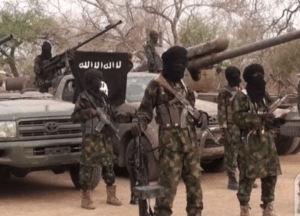ISWAP Kill Four Soldiers, Destroy Military Base in Borno Attack
At least four soldiers have been confirmed dead, and several others injured, following a brutal attack on a military base in Damboa Local Government Area of Borno State. The assault, carried out by fighters of the Islamic State of West African Province (ISWAP), took place on Sunday evening, dealing a heavy blow to the military’s operations in the region.
The terrorists, riding on motorcycles, stormed the village of Warja, located between Sabon Gari and Damboa, and launched a coordinated assault on the military base. Overwhelmed by the insurgents’ superior firepower and numbers, the soldiers suffered casualties as the attackers destroyed military vehicles and equipment.
According to security sources, the insurgents set fire to numerous armored vehicles, including tanks and personnel carriers, before looting a significant cache of weapons and ammunition. Reports indicate that several operational vehicles were also torched in the aftermath of the raid.
Security analyst Zagazola Makama disclosed that the scale of destruction was massive, with ISWAP fighters successfully overrunning the base. A source from the Civilian Joint Task Force (JTF) confirmed that the assailants arrived in large numbers, making it difficult for the soldiers to repel the attack.
Sunday’s ambush adds to the growing list of violent assaults carried out by ISWAP in the Northeast, raising concerns over the security situation in the region. Despite repeated military operations aimed at neutralizing insurgents, the persistent attacks highlight the group’s resilience and evolving tactics.

Security experts are calling for urgent reinforcement of military bases in vulnerable locations, emphasizing the need for improved intelligence gathering and rapid response capabilities. The Nigerian Army is yet to release an official statement regarding the incident, but sources say efforts are ongoing to track and neutralize the attackers.
As the fight against insurgency continues, the latest attack underscores the critical need for a more strategic approach in tackling the growing threat posed by ISWAP and other terrorist groups operating in the region.


